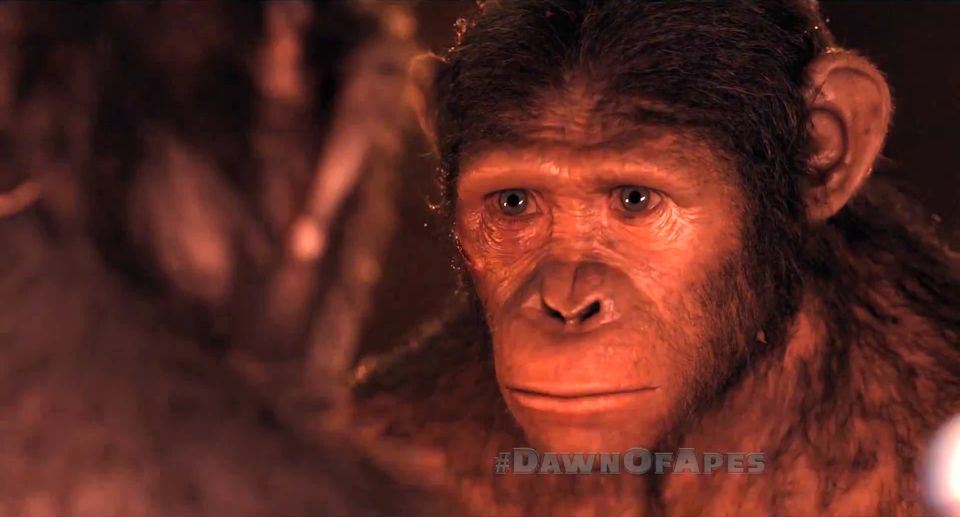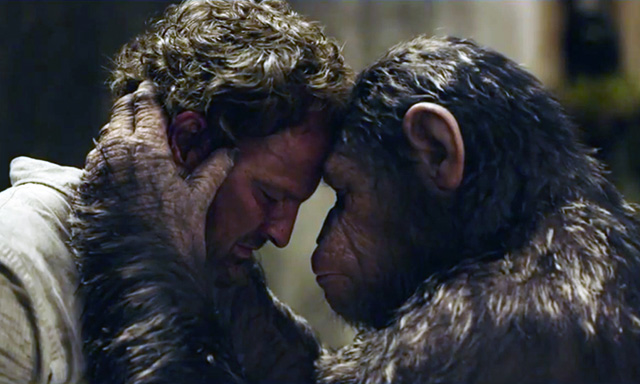Dawn of the Planet of the Apes (2014)
CAST: Andy Serkis, Jason Clarke, Gary Oldman, Keri Russell, Toby Kebbell, Kirk Avecedo, Kodi Smit-McPhee, Nick Thurston
REVIEW:
WARNING: THIS REVIEW WILL REVEAL ASPECTS OF THE FILM’S PLOT
Dawn of the Planet of the Apes, a follow-up to 2011’s Rise of the Planet of the Apes and the second installment in a prequel/reboot series inching things closer to the 1968 original film, surpasses its predecessor by such a wide margin that it reduces it to an extended prologue and set-up. Few sequels surpass the originals; even fewer do it this far. Rise had various fascinating moments but was less than the sum of its parts. Dawn takes things introduced in Rise and goes much farther and deeper with them, and is an all-around stronger motion picture.
We pick up a number of years after the ending of the first film. In the meantime, the virus inadvertently created and released by scientists experimenting on laboratory chimps has decimated the human population, and they are reduced to scattered pockets of genetically immune survivors struggling to hold on to a sliver of civilization which has mostly collapsed. Meanwhile, the escaped hyper-intelligent apes led by Caesar (motion capture performance by Andy Serkis) are thriving, building a fledgling society with rules (“ape must not kill ape”), an educational system, and a permanent primitive settlement deep in the California Redwoods which includes Caesar’s wife Cornelia (Judy Greer) and son Blue Eyes (Nick Thurston). No humans have been seen for years, and the apes wonder if they’re all gone. This is proven wrong when a band of humans and Caesar’s apes stumble across each other in the woods, including trigger-happy hothead Carver (Kirk Avecedo) and reasonable Malcolm (Jason Clarke), his wife Ellie (Keri Russell), and teenage son Alexander (Kodi Smit-McPhee). Malcolm’s group has come from a colony living in the ruins of San Francisco led by Dreyfus (Gary Oldman) to restore the power grid, which necessitates intruding into Caesar’s territory. After a distrustful beginning, Caesar and Malcolm work out an arrangement for mutual cooperation, and for a time, peace seems within their grasp. But one of Caesar’s chief warriors, scarred former lab chimp Koba (Toby Kebbell), consumed with a bitter hatred of humans, lurks on the sidelines. In Koba’s eyes, Caesar’s willingness to trust humans makes him weak, and soon conflict will arise between Koba and Caesar, and by extension between apes and humans.
Dawn of the Planet of the Apes takes its time with set-up. Some will fidget at the (initially) leisurely pace and the amount of time the movie takes to get going, but later events would not have the impact they do if the principal characters and their situation was not established strongly. And unlike Rise, where a marked gap existed between the three-dimensional, compelling ape characters and their thinly-drawn human counterparts, an effort is made here to make things more even. Ape characters who were introduced in Rise, principally the scarred, hateful Koba, are given much more prominence here. We get family scenes with Malcolm and his wife and son, and Malcolm’s son Alexander is a clear counterpart to Caesar’s offspring Blue Eyes. There’s nothing particularly complex about Malcolm and his family, but we like them enough to have a rooting interest in them making it out alive, which is more than can be said for the first movie’s shrug-inducing humans. While the first movie had the “playing God” angle, here we have the kinds of social commentary expected from these types of movies, both about how seemingly dissimilar groups can find common ground, and about the destructive consequences of bigotry and hatred. The movie hits its points in ways that aren’t exactly subtle, but avoid being preachy.
Dawn might take a long while to get to much action–apart from an opening encounter with a grizzly bear–but when it kicks into high gear, it features large-scale battle scenes that easily surpass the Golden Gate Bridge fight in Rise, featuring gun-toting apes on horseback charging a barrage of gunfire, and a climactic one-on-one hand-to-hand ape-versus-ape smackdown that vaguely recalls, of all things, an amped-up, live-action version of Simba vs. Scar from The Lion King, and is every bit as satisfying. The finale is downbeat but satisfying, and leaves the door open for an already in-the-works third installment.
 A word must be said about the special effects. Rise‘s effects were good–sometimes very good–but the digital animators giving the simian characters life have climbed to another level here. As before, all of the apes here are CGI creations, but the ape characters are every bit as believable as Gollum in The Lord of the Rings or the Na’vi in Avatar, and on a technical level might even surpass them. The level of detail–the wetness of rain-drenched hair, for example–is astonishing. Even on a couple occasions when we go into extreme close-ups on an ape character’s eyes, never do they look less than real, and the depth and range of emotions they project is remarkable, a perfect melding of human acting and computer wizardry.
A word must be said about the special effects. Rise‘s effects were good–sometimes very good–but the digital animators giving the simian characters life have climbed to another level here. As before, all of the apes here are CGI creations, but the ape characters are every bit as believable as Gollum in The Lord of the Rings or the Na’vi in Avatar, and on a technical level might even surpass them. The level of detail–the wetness of rain-drenched hair, for example–is astonishing. Even on a couple occasions when we go into extreme close-ups on an ape character’s eyes, never do they look less than real, and the depth and range of emotions they project is remarkable, a perfect melding of human acting and computer wizardry.
Reprising his role as Caesar as he has grown into his role as the ape leader since the events of Rise, Andy Serkis gets more spoken dialogue this time around than his couple brief–but impactful–utterances in the first installment, and he and the filmmakers bring a fierce nobility to Caesar. As the main human face onscreen, Jason Clarke, an Australian character actor some may remember as the brother of Shia LaBeouf and Tom Hardy in Lawless or the cuckolded Wilson in The Great Gatsby, is fine making Malcolm a sympathetic protagonist, even if he never quite steals any scenes from Caesar. Gary Oldman, the only “name” in the cast, gives a nicely-played supporting performance where he does a smidgeon of his patented ranting and raving but doesn’t go overboard with it, and also avoids playing Dreyfus as villainous. The real “villain” here is Koba, consumed with hatred and itching for an excuse to attack the humans. Between the behind-the-scenes acting of Toby Kebbell, and a fearsome character design, Koba is a ferocious antagonist who represents a formidable adversary for both the humans and Caesar himself. Among the new characters, Caesar’s son Blue Eyes (Nick Thurston) makes an impression, while Keri Russell gets little to do besides look worried.
Dawn of the Planet of the Apes is an intelligent sci-fi drama that spends more time on world-building, storytelling, and character development than producing an adrenaline rush or appealing to testosterone. It has a strong narrative that takes inspiration from such sources as Julius Caesar (for obvious reasons) and has the structure of a Shakespearean tragedy. Unlike in Rise, where Caesar was the only dimensional character among thin cardboard cutouts, none of the principals here are one-note caricatures. Caesar is a noble leader but not an infallible one, and is torn between his soft spot for humans and his determination to protect his people. Likewise, Gary Oldman’s Dreyfus is willing to go to war with the apes to claim the territory he needs to reactivate the power grid, but he’s motivated not by malice but by putting the survival of his own people first. He allows Malcolm’s attempts at diplomacy, albeit grudgingly, and only goes to war after Koba has struck the first blow. When the reactivated power allows Dreyfus to turn on his computer for the first time in years, Oldman also gets a poignant moment where he breaks down in tears while viewing pictures of his dead children. Koba is the villain of the piece, and is hateful and detestable enough to get audience members rooting for his comeuppance, but he too has his reasons, underscored when Caesar speaks of “human work” and Koba points out the many scars inflicted by past torturous lab experiments, scornfully naming each one as “human work”. The heroes aren’t infallible, and the antagonists are better-motivated than many onscreen examples (just compare them to the first movie’s “bad guys”). The climax provides a rollicking ride that has more impact than the hollow special effects spectacles of the Transformers series could ever hope to have, because we give a damn about the characters here.
After the sporadically compelling but underwhelming Rise of the Planet of the Apes, I was lukewarm in my anticipation of a follow-up. I never expected the sequel to ascend to this high level. This is easily on another level of filmmaking and storytelling prowess, and leaves one curious to see how the third film will continue the story and inch it closer toward linking up with the 1968 original. In the meantime, we have a sci-fi epic with visual wonder, heart, and depth to appreciate.
* * * 1/2
